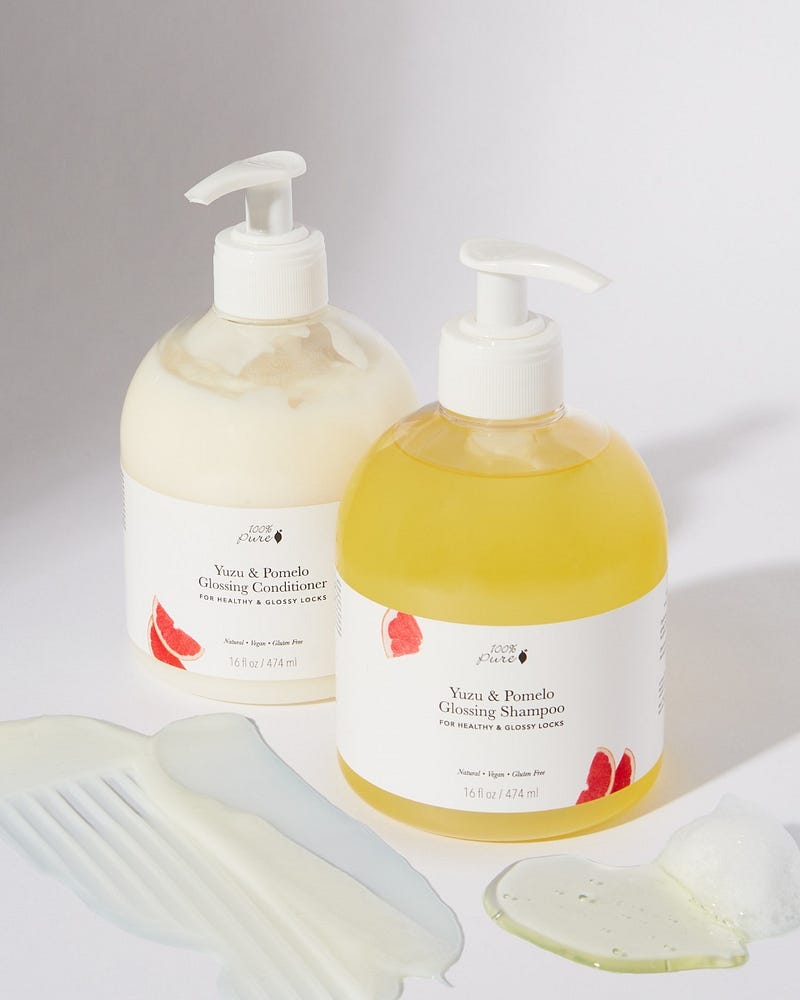Embracing Nature: A Guide to Natural Shampoo for Healthy, Beautiful Hair
Have you ever noticed how the world of beauty is getting a natural makeover? Yup, the beauty industry is taking a detour towards more eco-friendly choices. Now, think about your hair — your crowning glory. It’s like giving your hair a ticket to the botanical garden of goodness. The idea is simple: Nature’s gifts are your hair’s new best friend, and we’re about to uncover why.

Unpacking ‘Natural’ in Hair Care
When it comes to shampoos, the term ‘natural’ refers to formulations predominantly derived from plant-based sources and minimally processed ingredients. These shampoos typically avoid synthetic additives like sulfates, parabens, and artificial fragrances. The focus lies on harnessing the inherent benefits of botanicals and essential oils for cleansing and nourishing hair, often aligning with environmentally conscious practices.
While ‘natural’ emphasizes plant-derived ingredients, ‘organic’ takes it a step further. Organic shampoos are made from ingredients grown without synthetic pesticides or fertilizers. On the other hand, ‘clean’ extends beyond ingredients to manufacturing and packaging, emphasizing ethical sourcing, sustainability, and transparency in all aspects of production.
Why Nature Matters
Standard shampoos often harbor a cocktail of common chemicals that can silently harm both your hair and overall health. These chemicals include sulfates, parabens, and synthetic fragrances, which might strip natural oils, irritate the scalp, and even have potential long-term health effects.
Opting for natural shampoos presents a host of benefits. First, they’re gentler on the scalp, reducing irritation and promoting healthier hair. Second, they tend to be biodegradable and environmentally friendly, minimizing your carbon footprint. By embracing nature’s bounty, you care for your hair and contribute positively to the planet’s well-being, making the switch a holistic win for both you and the environment.
Factors to Consider When Choosing Natural Shampoo
Before you make the switch to natural shampoo, consider these factors:
1. Hair Type & Needs
Understanding your hair type and its specific needs is crucial when selecting a natural shampoo. Different hair types require different care to achieve optimal health and appearance. Here are some common hair types and their corresponding needs:
Oily Hair: Oily hair benefits from shampoos that effectively cleanse the scalp without stripping it of essential oils. Look for a gentle formula that balances oil production.
Curly Hair: Curly hair tends to be drier due to the natural oils struggling to travel down the hair shaft. Choose a hydrating shampoo that enhances curl definition and minimizes frizz.
Dry Hair: For dry hair, seek moisturizing shampoos with ingredients like natural oils, shea butter, or aloe vera to restore hydration and manageability.
Thin or Fine Hair: Individuals with thin or fine hair might opt for volumizing shampoos that add body without weighing down the hair.
Color-Treated Hair: Colored hair requires special care to prevent fading. Look for sulfate-free shampoos formulated to protect and prolong the vibrancy of your hair color.
2. Ingredient Knowledge
Reading and understanding shampoo labels can empower you to make informed choices. Look for these natural ingredients that are beneficial for hair health:
Aloe Vera: Soothes the scalp and moisturizes hair strands.
Coconut Oil: Nourishes and adds shine to hair, also offering antimicrobial properties.
Argan Oil: Rich in vitamins and fatty acids, it helps improve hair strength and texture.
Tea Tree Oil: Has antifungal properties and can assist with dandruff and scalp issues.
Chamomile: Soothes the scalp and enhances natural highlights in blond hair.
Rosemary: Stimulates hair growth and promotes a healthy scalp.
Biotin: Strengthens hair and encourages growth.
Silk Amino Acids: Improve hair elasticity and softness.
3. Ethical and Sustainability Practices
Supporting brands with ethical and sustainable practices is a powerful way to contribute to a healthier planet. Consider the following when evaluating a brand’s sustainability efforts:
Sustainable Packaging: Brands like 100% PURE prioritize eco-friendly packaging, often using recycled materials or biodegradable options to reduce waste and minimize their environmental footprint.
Ethical Sourcing: Brands committed to ethical sourcing ensure that their ingredients are obtained responsibly, supporting fair labor practices and local communities.
Cruelty-Free: Choose brands that do not test their products on animals, indicating a commitment to both animal welfare and ethical practices.
Transparency: Brands that openly share information about their sourcing, production processes, and ingredient origins demonstrate their dedication to transparency and authenticity.
Making the Transition: What to Expect
When transitioning to natural shampoo, brace yourself for a “detox” phase. Your hair might initially feel different — it could be oilier or drier than usual as your scalp adjusts to the absence of harsh chemicals. This phase can last a few weeks as your hair and scalp recalibrate. It’s a temporary journey towards healthier, more balanced hair, so don’t be discouraged.
Patience is your ally during this transition. Over time, as your scalp finds its equilibrium, you’ll notice substantial long-term benefits. Your hair might become shinier, stronger, and less prone to breakage. The absence of synthetic chemicals can lead to reduced irritation and a healthier scalp. Plus, your environmental footprint lessens. So, stay persistent — the natural path offers rewards that far exceed the temporary adjustment period.
By choosing natural shampoo, you’re not only nourishing your hair but also safeguarding your well-being by avoiding potentially harmful chemicals. This journey of mindful selection ripples outward, resonating with the environment as you reduce your ecological impact. With each wash, you’re contributing to a healthier world and embracing a lifestyle where beauty aligns with nature’s wisdom.



Comments
Post a Comment